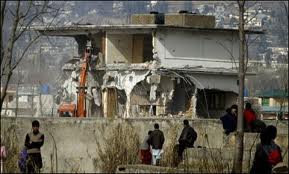
Before his death, Osama bin Laden boldly commanded his network to organize special cells in Afghanistan and Pakistan to attack the aircraft of President Obama and Gen. David Petraeus.
“The reason for concentrating on them is that Obama is the head of infidelity and killing him automatically will make (Vice President Joe) Biden take over the presidency,” the al-Qaida leader explained to his top lieutenant. “Biden is totally unprepared for that post, which will lead the U.S. into a crisis. As for Petraeus, he is the man of the hour … and killing him would alter the war’s path” in Afghanistan.
Administration officials said Friday the Obama-Petraeus plot was never a serious threat.
The scheme was described in one of the documents taken from bin Laden’s compound by U.S. forces on May 1, 2011, the night he was killed. I was given an exclusive look at some of these remarkable documents by a senior administration official. They have been declassified and will be available soon to the public in their original Arabic texts and translations.
The man who bin Laden hoped would carry out the attacks on Obama and Petraeus was Pakistani terrorist Ilyas Kashmiri.
“Please ask brother Ilyas to send me the steps he has taken into that work,” bin Laden wrote to his top lieutenant, Atiyah Abd al-Rahman. A month after bin Laden’s death, Kashmiri was killed in a U.S. drone attack.
Bin Laden’s plot to target Obama was probably bluster since al-Qaida apparently lacked the weapons to shoot down U.S. aircraft. But it’s a chilling reminder that even when he was embattled and in hiding, bin Laden still dreamed of pulling off another spectacular terrorist attack against the United States.
The terrorist leader urged in a 48-page directive to Atiyah to focus “every effort that could be spent on attacks in America,” instead of operations within Muslim nations. He told Atiyah to “ask the brothers in all regions if they have a brother … who can operate in the U.S. (He should be able to) live there, or it should be easy for him to travel there.”
U.S. analysts don’t see evidence that these plots have materialized.
“The organization lacks the ability to plan, organize and execute complex, catastrophic attacks, but the threat persists,” said a senior administration analyst who has carefully reviewed the documents.
The bin Laden who emerges from these communications is a terrorist CEO in an isolated compound, brooding that his organization has ruined its reputation by killing too many Muslims in its jihad against America. He writes of the many departed “brothers” who have been lost to U.S. drone attacks. But he’s far from the battlefield himself in his hideout in Abbottabad, Pakistan, where he seems to spend considerable time watching television.
Because of constant harassment and communications difficulties in Pakistan’s tribal areas, bin Laden encouraged al-Qaida leaders to leave North and South Waziristan for more distant and remote locations.
Bin Laden’s biggest concern was al-Qaida’s media image among Muslims. He worried that it was so tarnished that, in a draft letter probably intended for Atiyah, he argued the organization should find a new name.
The al-Qaida brand had become a problem, bin Laden explained, because Obama administration officials “have largely stopped using the phrase ‘the war on terror’ in the context of not wanting to provoke Muslims,” and instead promoted a war against al-Qaida.
Bin Laden ruminated about “mistakes” and “miscalculations” by affiliates in Iraq and elsewhere that had killed Muslims, even in mosques. He told Atiyah to warn every emir, or regional leader, to avoid these “unnecessary civilian casualties,” which were hurting the organization.
It would be better to concentrate on attacking the U.S. homeland. This led to sharp disagreements with his deputy, Ayman al-Zawahiri, who favored easier and more opportunistic attacks on U.S. forces in Iraq, Afghanistan and other areas.
Bin Laden and his aides hoped for big terrorist operations to commemorate the 10th anniversary of Sept. 11, 2001. They also had elaborate media plans. Adam Gadahn, a U.S.-born media adviser, even recommended to his boss what would be the best television outlets for a bin Laden anniversary video.
“It should be sent for example to ABC, CBS, NBC and CNN, and maybe PBS and VOA. As for Fox News let her die in her anger,” Gadahn wrote. At another point, he said of the networks: “From a professional point of view, they are all on one level — except (Fox News) channel, which falls into the abyss as you know, and lacks neutrality, too.”
What an unintended boost for Fox, which can now boast that it is al-Qaida’s least favorite network.
